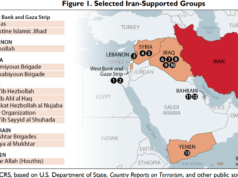Shifting its focus from spying on the countries on its periphery, cyber experts say China has moved to interests farther afield. Specifically, China’s leaders have apparently been trying to figure out what the United States is going to do about the emerging chaos in Iraq after ISIS seized over a third of Iraqi territory. In an operation called “Deep Panda,” Chinese cyber spies targeted the top strategic think tanks and policy organizations in Washington for answers.
It has long been the case that China’s “official” hackers targeted U.S. government organizations and institutions. But focusing on think tanks is something that is, apparently, new.
One presumes that the Chinese wanted to read the private e-mails as well as texts and opinion pieces of American-based experts to try toget an inside handle on America’s strategic posture toward Iraq. While we don’t know which organizations were targeted, it is likely the Chinese chose the ones they felt are most closely aligned with the current administration because their experts would have close ties to Obama’s National Security Council, Pentagon, CIA, State Department and, possibly, to other “insiders” who use think tanks as sounding boards.
It has been said that one can eat out every day in Washington by visiting different policy organizations for the ubiquitous “luncheon panel and discussion.” Foreign governments with representation in Washington, who generally devote a lot of effort to gleaning policy information, often find it easier to learn the nuances of American government thinking and talk to those who talk to administration sources than it is to get appointments with the sources themselves. China, like Russia, and all the friendlier countries (UK, Japan, Israel, and many others) make the rounds, collect information, and send it home.
But this time, China opted to collect information by hacking, not meeting. Why?
By relying on a secret operation to steal information, China’s leaders probably thought they could find out more than think tank specialists would be willing to tell them in public discussions. For one thing, China is not in good odor today, even with the liberal think tanks that support the Obama Administration. That is in part because China is a growing power and increasingly a threat to American interests. But the bigger reason is that China’s increasingly poor track record on human rights and freedom is offensive both to liberal and conservative thinkers in Washington. A Chinese official, even one who ostensibly presents him/herself as an independent academic seeking information, is likely to be accosted with complaints about China’s behavior toward dissidents and minorities. From China’s perspective, this results in low productivity garnering needed information. Thus there is reason to believe that China needs to steal information because it cannot get it through “normal” channels.
China maintains a sophisticated hacking capability with all the latest technology and almost certainly has been following the relationships among think tank experts and administration officials — this administration and prior ones — for years. The incorrigible sloppiness of Americans toward their own security is certainly well known to the Chinese, and it goes without saying that they exploit it. The blabbermouths on cellphones, Twitter, Facebook, LinkedIn, and everywhere else not only provide timely information on specific policy subjects, but the Chinese can easily connect the dots and figure out who is connected to whom and which relationships are the most productive. A think tank leader, therefore, will be known to the Chinese not only for what he or she says, but also by his best connections, his reliability as a source, and his influence in decision-making circles. The rapid shift of operational hacking resources to find out about Iraq was easy for the Chinese. They had already mapped the network and only needed to probe more deeply and urgently to get answers to their specific questions.
Why was Iraq so important?
China is a relatively big industrial player in Iraq. Iraq is China’s fifth-largest overseas oil supplier behind top producer Saudi Arabia, and China as an imported oil consumer is larger than the United States. Unlike the United States, however, China has no military capability of any significance in the Middle East and cannot either ensure the stability of oil-supplying regimes or protect the sea lines of communication (SLOC) that bring the oil to China’s refineries. Ironically, while China is in the midst of a significant military buildup challenging U.S. interests in Asia, China is depending entirely on the U.S. for protection of its vital oil supplies. While Americans don’t generally recognize it, a substantial part of our defense budget directly benefits China in this way while, at the same time, China is assiduously stealing American defense secrets in an unparalleled, brazen manner.
While China could live without Iraq’s oil, and can afford even to lose the $3 billion or so it has invested in Iraqi oil projects, the main Chinese interest is the risk that an out of control Iraq will lead to a general political collapse even beyond Iraq’s borders. A blow-up in Saudi Arabia, for example, could create chaos in China itself.
This is the same threat that, naturally, concerns the U.S. and its European allies. But, if the Chinese have been listening carefully, as they have, they won’t be very happy with what they are hearing through their hacking channels. Right now an effective military response by the United States to the increasing chaos in Iraq seems unlikely, and the U.S. position is further complicated by the administration’s foolish attempt to find common ground with the Iranians and Syrians (along with Hizb’allah). This moronic move will do nothing more than further frighten Saudi Arabia and push the Sunni Kingdom into ISIS’s outstretched and wicked arms.
In short, China’s leaders have good reason to be depressed. All their hacking is likely to tell them is that America is not coming to rescue their economic or energy position in Iraq.





